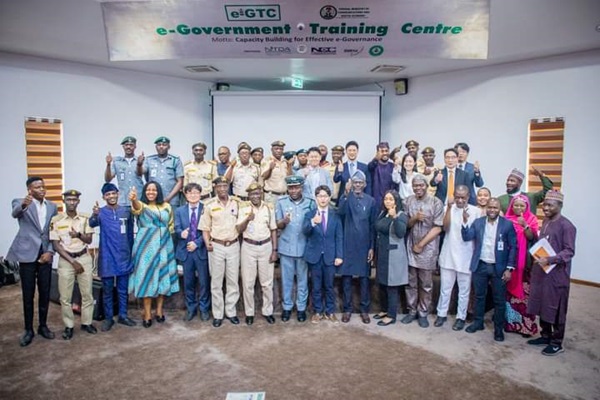
The National Information Technology Development Agency (NITDA) has officially unveiled the second phase of the Nigerian e-Government Master Plan towards enhancing transparency in government processes.
The director-general of NITDA, Mallam Kashifu Abdullahi announced the development during the handover of deliverables to CEOs of NITDA, National Identity Management Commission (NIMC), Nigerian Immigration Service (NIS) and the Nigerian Customs Service (NCS) held at the e-Government Training Centre in Kubwa, Abuja.
The event marked the successful implementation of the first phase of the Nigerian e-Government master plan, sponsored by the Korean International Cooperation Agency (KOICA). Represented by the director of IT infrastructure solutions at NITDA, Mr. Oladejo Olawumi, Abdullahi stated that the primary objective was to build on the progress achieved and position the general government enterprise architecture as a cornerstone for digital governance in Nigeria under the new Strategic Roadmap and Action Plan (SRAP 2.0).
Abdullahi explained that the enterprise architecture, which organises enterprise resources, including business processes, data, information and technology, aims to provide the capabilities required for the consistent achievement of organisational functions and mandates. He emphasised that SRAP 2.0 focuses on the infrastructure pillar, committed to ensuring seamless and inclusive access to digital services.
The director-general highlighted the significance of the enterprise architecture, stating, “It is in line with this administration’s commitment to ensuring the implementation of sustainable initiatives and programmes that will stimulate and rejuvenate the economy.” He connected the strategic plan to drive transparency in government, improve the quality and cost-effectiveness of public service delivery in Nigeria.
Abdullahi noted that NITDA had developed the Nigerian Government Enterprise Architecture (NGEA) during the first phase of the e-government master plan, launched in March 2019. He detailed the positive outcomes, including the clearing of numerous IT projects, improvement of the national IT clearance policy drive and the assessment of IT systems and digital services in 200 federal and public institutions.
The director-general underscored the critical role of the Nigerian Government Enterprise Architecture in implementing various e-government regulatory instruments. He mentioned the e-government interoperability framework, designed to enable interoperability between all government services and the digital public infrastructure (DPI) crucial for integrating government services.
The country director of the Korean International Cooperation Agency (KOICA), Mr. Songil Son commended NITDA for coordinating the project effectively, positioning the government enterprise architecture as a cornerstone for digital governance in Nigeria.
Representatives from the Nigeria Customs Service and Nigeria Immigration Service expressed optimism that the guide would ease the perfection of digital governance, fostering inclusiveness, transparency and progress in the country. They assured their commitment to leveraging the framework as a catalyst for achieving Nigeria’s strategic aspirations.


